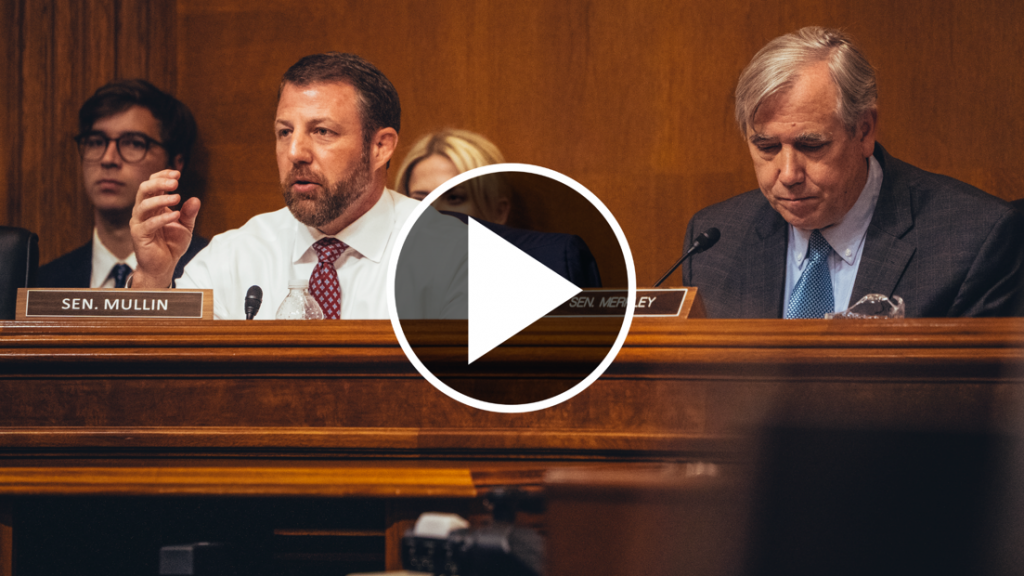
On June 15th, U.S. Senator Markwayne Mullin (R-OK) delivered the opening statement and questioned witnesses during a Senate Environment and Public Works (EPW) Committee hearing on the impacts of plastic production and disposal on underserved communities.
In his remarks, Mullin, the Ranking Member of the Chemical Safety, Waste Management, Environmental Justice, and Regulatory Oversight Subcommittee, brought attention to the essential role plastics play in Americans’ everyday lives. From live-saving medical devices to clean food and drinking supplies, Mullin emphasized the vital role of U.S. plastics manufacturing which fuels American jobs and reduces our reliance on adversaries like China who have far dirtier environmental practices.
Mullin also stressed the significance of separating radical leftist policies guised under “environmental justice” from the important right all Americans can agree on: everyone deserves clean air and water and access to reliable energy sources that will help create a cleaner, healthier, and safer future.

Click here for a video of Mullin’s opening remarks.
Click here to watch Mullin’s witness Q&A.
Opening remarks as delivered:
As we discuss plastics, I do want to say, I think understanding the plastics that we have and the reliability that plastics bring and the amount of technology that we use plastics in, I would say everybody in this committee thinks this is an important topic…I think we can all agree this is something we have got to pay attention to, but how do we do it without making us more reliant on other countries, how do we do this without limiting the ability for us to continue moving forward and society as a whole because everybody here relies on plastics.
Everyone has plastics either on your feet or on your clothes, everybody here that has a cell phone has plastic. Everybody that was driven here by either the metro or by a vehicle. every Electric vehicle our there cannot be produced without plastics. Everyone that goes to bed, wakes up in the morning and dries off with a towel – that’s on plastics. Everybody that goes grocery shopping and buys their food – that’s on plastics. It’s not as though we can just limit it, it’s how can we do it better. We have to have an open conversation, how can we do it better? I don’t believe we have a plastic problem; we have a recycling problem.
We have to learn how to make recycling valuable where it allows us to use that as a value base. If we ignore that issue, you are ignoring that reality. What is going to replace plastics? If someone had a solution for that we would probably already be there. But there isn’t.
I would like to first start by thanking our witnesses here today for attending this Subcommittee Hearing, including Mr. Kevin Sunday and Mrs. Donna Jackson.
Today’s hearing highlights an originally novel idea called “Environmental Justice” that has been transformed away from its original intent of helping poor or marginalized communities specific needs, into a social movement Democrats have taken over to push progressive policies forward under the guise of social and racial equity.
Something I want to make clear, is that we don’t have a plastic problem, we have a plastic handling problem.
I think all of us on this committee can agree to this: everyone deserves clean air and water and access to reliable energy sources that will help create a cleaner, healthier, and safer future.
What is missing from this discussion, is the critical role the U.S. plays in manufacturing essential plastic materials that are used in medical applications, helps deliver our clean water, and keeps our food fresh.
Some witnesses today might make statements that plastics are harmful to your health, but they ignore the fact that plastics are already heavily regulated in the U.S. and have to go through intensely rigorous standards guided by science to be used in application, especially when it comes in contact with your food or medicine.
When it comes to facility siting for these companies, they are not just investing in the buildings or the land, they are investing in the communities by providing jobs, health care plans, and economic growth for the surrounding area.
These benefits provide widespread opportunity for access and stability in rural states like Oklahoma.
These are not short-term investments either, and it is in the manufacturing companies’ interest to ensure good relationships with the communities around them, not only because it is the right thing to do, but because the labor pool is likely coming from within these very communities.
Instead of halting infrastructure projects or manufacturing development that results in U.S. job loss and more reliance on countries like China to produce critical materials needed for modern life, why would we not revert our focus to improving circularity.
As I mentioned in our previous plastics subcommittee hearing, circularity means plastic reuse which is most productive through innovative technologies such as advanced recycling.
If we oppose a science-based solution that makes it possible to capture and reuse large volumes of used plastic that is currently going unrecycled, do we really care about plastic waste?
Thank you Chairman and I yield back.














